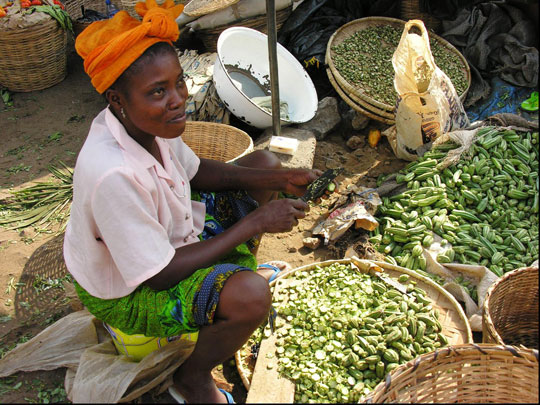Another generation, Africa can support itself
The Conference of African Countries on Food Situation said that in about a generation, Africa could feed itself and become a major exporter of agricultural products thanks to infrastructure and mechanical improvements. chemistry and use of genetically engineered plants.
In a recent Conference on Food Situation in Africa, leaders of continental countries agreed that long-term agriculture remains Africa's key economy.

After another generation, Africa can export agricultural products. (Photo: Internet)
The leading agricultural expert, Professor Calestous Juma, who teaches at Harvard University, said in the conference, " The conference emphasized the responsibility of every African President to modernize the economy, meaning first. all began working on agricultural modernization ' and ' H almost like countries are oriented towards genetic engineering '.
In recent years, the world agricultural output has increased rapidly, but Africa is still stagnant despite great land and abundant labor resources. In the past four decades, world food production has increased by 145%, this output in Africa has decreased by 10%. While 70% of the African population is engaged in agriculture, from 1990 to now, the number of people who do not eat enough has increased from 100 to 250 million people.
Mr. Juma also said that at the Conference, all countries agreed to expand infrastructure, including roads, irrigation and energy facilities.
Farms must be mechanized, build storage facilities and processing facilities, and apply biotechnology and create transgenic crop varieties.
The above actions must be addressed in the country development policy at the highest level and done in a coordinated manner, which cannot only build good roads to import seeds and transport products.
Technical equipment, facilities and fertilizer use in Africa are inferior to the average worldwide, shown in the following table (From top to bottom: Number of tractors over 100 km2 - Rate of irrigated land - Amount of fertilizer used (kg) per 1 hectare)
" Transport ministers pay attention not only to developing roads between rural areas, but also to connect rural and urban areas, " said Professor Juma, who believes in food crops such as millet. , sorghum, vermicelli, cassava and taro will be grown in an increasingly large area in Africa, he warned farmers to prepare and adapt to climate change to convert not only varieties crops that even her herd.
" Plants like flourfruit (breadfruit) from the Pacific must be planted in Africa on a large scale because they are resistant to climate change ."
Prof. Juma also emphasized genetically modified plants (abbreviated GM) in which GM cotton and GM corn were successfully grown in Africa. Right now, there must be a variety of other plants to this continent so that they adapt gradually to the local natural conditions and the main direction is to bring into practice the achievements of biotechnology.
George Mukkath, program director for Africa's Farms, welcomed this conference and said African countries should spend no less than 10% of GDP on agricultural development. According to him, " This is what we have been talking about for many years but there is no consensus like this. Agricultural productivity in Africa is very low. If invested, African farmers are fully capable. producing a food output that is not only enough to feed itself but can also be exported. '
- The first generation DVD devices do not support copying
- 8 false rumors that everyone believes in Africa
- Reaching the universe to promote poverty eradication
- South Africa: The climate warms up again with the outbreak of malaria
- These 'Alpha Generals' will change the world forever
- Magical Africa through photo beams
- 8 maps blow your thoughts about the black continent
- Africa is strong enough to
- Laser chip
- Africa's most bizarre fox: Cute to beat but even hunted newspapers
- Only half of today's computers support Windows Vista
- The Ebola epidemic will be more raging for a year
 'Barefoot engineer' invents a pipeless pump
'Barefoot engineer' invents a pipeless pump Process of handling dead pigs due to disease
Process of handling dead pigs due to disease Radiometer
Radiometer Warp Engine: Technology brings us closer to the speed of light
Warp Engine: Technology brings us closer to the speed of light